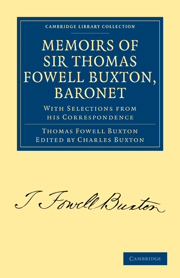Book contents
- Frontmatter
- PREFACE
- Contents
- CHAPTER I 1786–1802
- CHAPTER II 1802–1807
- CHAPTER III 1807–1812
- CHAPTER IV 1812–1816
- CHAPTER V 1816–1817
- CHAPTER VI 1818, 1819
- CHAPTER VII 1820, 1821
- CHAPTER VIII 1821–1823
- CHAPTER IX 1823–1826
- CHAPTER X 1822–1826
- CHAPTER XI 1826, 1827
- CHAPTER XII 1827, 1828
- CHAPTER XIII 1828, 1829
- CHAPTER XIV 1829
- CHAPTER XV 1829, 1830
- CHAPTER XVI 1830
- CHAPTER XVII 1831
- CHAPTER XVIII 1832
- CHAPTER XIX 1833
- CHAPTER XX 1833
- CHAPTER XXI 1833, 1834
- CHAPTER XXII 1834, 1835
- CHAPTER XXIII 1835, 1836
- CHAPTER XXIV 1836
- CHAPTER XXV 1837, 1838
- CHAPTER XXVI 1838
- CHAPTER XXVII 1838, 1839
- CHAPTER XXVIII 1839, 1840
- CHAPTER XXIX 1840
- CHAPTER XXX JUNE, 1840, TO APRIL, 1841
- CHAPTER XXXI 1841
- CHAPTER XXXII 1843, 1844
- CHAPTER XXXIII 1843, 1844, 1845
- RECOLLECTIONS OF SIR T. FOWELL BUXTON
- APPENDIX TO CHAP. XVII
CHAPTER XXVI - 1838
Published online by Cambridge University Press: 05 July 2011
- Frontmatter
- PREFACE
- Contents
- CHAPTER I 1786–1802
- CHAPTER II 1802–1807
- CHAPTER III 1807–1812
- CHAPTER IV 1812–1816
- CHAPTER V 1816–1817
- CHAPTER VI 1818, 1819
- CHAPTER VII 1820, 1821
- CHAPTER VIII 1821–1823
- CHAPTER IX 1823–1826
- CHAPTER X 1822–1826
- CHAPTER XI 1826, 1827
- CHAPTER XII 1827, 1828
- CHAPTER XIII 1828, 1829
- CHAPTER XIV 1829
- CHAPTER XV 1829, 1830
- CHAPTER XVI 1830
- CHAPTER XVII 1831
- CHAPTER XVIII 1832
- CHAPTER XIX 1833
- CHAPTER XX 1833
- CHAPTER XXI 1833, 1834
- CHAPTER XXII 1834, 1835
- CHAPTER XXIII 1835, 1836
- CHAPTER XXIV 1836
- CHAPTER XXV 1837, 1838
- CHAPTER XXVI 1838
- CHAPTER XXVII 1838, 1839
- CHAPTER XXVIII 1839, 1840
- CHAPTER XXIX 1840
- CHAPTER XXX JUNE, 1840, TO APRIL, 1841
- CHAPTER XXXI 1841
- CHAPTER XXXII 1843, 1844
- CHAPTER XXXIII 1843, 1844, 1845
- RECOLLECTIONS OF SIR T. FOWELL BUXTON
- APPENDIX TO CHAP. XVII
Summary
On quitting Parliament, Mr. Buxton had looked forward to a period of repose; but this expectation was not realized. Even before that time, an idea had suggested itself to his mind, the development of which proved more than sufficient occupation for all his remaining years.
“I well remember,” writes one of his sons, “the commencement of that long train of toils, anxieties, and sorrows. While my father and I were staying at Earlham, in the beginning of the summer of 1837, he walked into my room one morning, at an early hour, and sitting down on my bedside, told me that he had been lying awake the whole night, reflecting on the subject of the Slave Trade, and that he believed he had hit upon the true remedy for that portentous evil.”
Two years before this time, he had moved an address for making our treaties on this subject with foreign powers more stringent, and the penalties of the crime more severe. The idea that now struck him so forcibly, was this,—that “Though strong external measures ought still to be resorted to, the deliverance of Africa was to be effected, by calling out her own resources.”
For some months he was compelled to defer the following up of this new train of thought; but on reaching home at the fall of the year, he addressed himself to the pursuit with all his heart and mind, and never was his character shown more clearly than in his conduct of this great affair.
- Type
- Chapter
- Information
- Memoirs of Sir Thomas Fowell Buxton, BaronetWith Selections from his Correspondence, pp. 429 - 440Publisher: Cambridge University PressPrint publication year: 2010First published in: 1848

